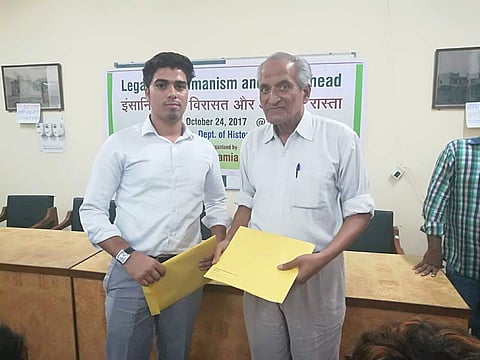

At a time when there is so much unrest, violence and hatred among the people in this country, Vipin Tripathi, a retired professor from Indian Institute of Technology Delhi, is trying to spread the message of peace and love among people across all the age groups - by distributing flyers, organising workshops on humanism, interacting with them on the serious issues in the country. He started this mission of spreading peace in 1989 and has been practising it till date. He says, "I am doing this because there is so much hatred and violence spewing in the world today. And it has increased in the past few years. Let's take the Kashmir situation post the Article 370 debacle, for example. It has been more than three months since the government has restricted people's movement, they are surrounded by the Indian army and phone calls have also been barred. The present Indian government thinks that they have done something daring, but their approach was completely wrong. They should have taken the Kashmiris into confidence before they could revoke section 370. They are as much Indians as we are. This has led to further polarisation in our country."
When it comes to the issue of Kashmir, Tripathi wants youngsters to raise their voices and tell the government what is right and wrong. He adds, "I want them to understand the agony of Kashmiris so that they can unite and fight on their behalf. I just want to tell them that we are not in war with Kashmir."
Tripathi also works as a convener for a non-governmental, not-for-profit organisation called Sadhbav that aims at developing grassroots resistance against communalism and mobilising people on basic issues like education. He explains, "This organisation was started in 1990 after the Bhagalpur riots and Ramshila Poojan movement which shook our country. We stood for clarity of perception in the midst of communal frenzy and organised marches, fasts, corner meetings and poster and flyer campaigns."
Apart from all this, Tripathi has been distributing flyers among people to educate them about different national and regional issues, all by himself. He also organises workshops for school and college students. While the Science students attend his physics workshop, the Arts students attend history workshops. "Even if you are not a student, you can attend one of these workshops to gain knowledge and interact with people. The speciality of my workshops is that the first half is related to the subject and the second half is all about humanism. I feel that opening up with students and youngsters for dialogue is the only way to curb hatred and violence. The prejudices are so strong that they are rooted in the psyche of young minds. Dialogue will help them to fight their own prejudices. Though it is a slow process, I feel that it will be successful one day," says Tripathi who is trying to reach every corner of North India.
Media plays a negative role
Apart from people and the government, the retired Physics professor believes that media including newspaper, television and social media have a greater role to play in conditioning the minds of young citizens. "These days, media hardly talks about the real issues that are of concern to society. By promoting selective news, they are directing people to form wrong opinions about fellow citizens."
NRC to roast the country
Another issue that Tripathi is worried about is the imposition of National Register of Citizens (NRC) policy in Assam that now threatens to be in force in the rest of the country. "When India gained independence in 1947, Gandhi said that people living in this country are the citizens of India. Then why this policy now? A few weeks ago, I travelled to Assam to do some groundwork. Most of these people who are out of the NRC list are not just non-Hindus. It includes poor and hard-working farmers who belong to different castes. Just because they did not have sufficient proof to prove their nationality does not mean they should be thrown out of the country. Hence I am going to pick this issue and talk to the people as well as parliament members."
During the last parliament elections, Tripathi started working on a project that aims to inculcate 'inclusive growth'. This includes the political, cultural, economic and educational inclusivity to bring the marginal section of the society to the mainstream. He says, "I will be conducting workshops on this theme across the country. We have already started writing booklets on this theme."
All 365 days dedicated to social work
When Tripathi was working at IITD, he would dedicate his summer holidays and evening hours during the college days to reach out to people. Now that he is retired, he dedicates all 365 days to his mission of peace. He says, "My father Hardas Sharma was a freedom fighter and I have always followed the Gandhian principles."
